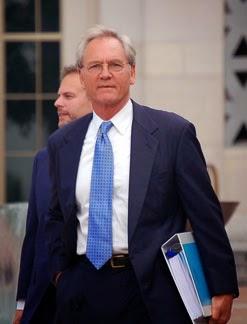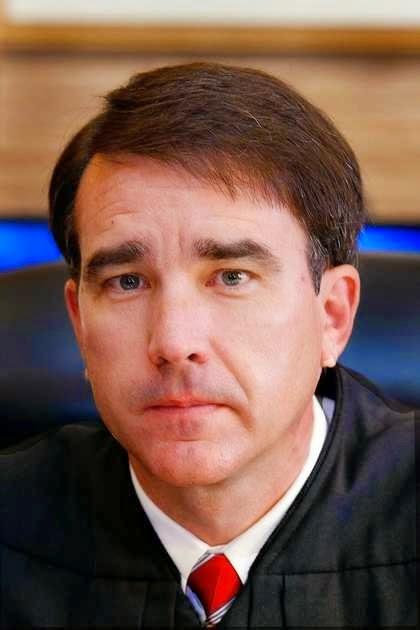
Don Siegelman
The primary thrust of last week's Don Siegelman story, on the surface, was whether the former Alabama governor would be released from federal prison, pending an appeal before the U.S. Eleventh Circuit in January. New judge Clay Land, on the case in the wake of the Mark Fuller wife-beating scandal, denied Siegelman's request for release--and that was at the heart of almost all news coverage.Beneath the surface, and somewhat buried in Land's 31-page opinion, was an issue that is much darker and potentially explosive. In fact, it points to a cover-up of criminal behavior that, if fully exposed, could rock our democracy. (See opinion at the end of this post.)
We're talking about discovery, specifically an inquiry into the supposed recusal of Leura Canary, the U.S. attorney over the Middle District of Alabama, where the Siegelman case was held. On page 3 of his order, Land states that discovery on the Canary recusal is one of three issues Siegelman raises on appeal--then the judge waits until the final four pages to address it, stating that "the Court leaves the most difficult issue for last."
Why is it the most difficult issue? Because Leura Canary clearly had a financial interest in the outcome of the Siegelman case; her husband, Bill Canary, had served as a paid consultant for Siegelman's political opponents. That violates Siegelman's fundamental due-process rights under the Fourteenth Amendment. Specifically, it deprived Siegelman of his right to a disinterested prosecutor, which Land addressed as follows:
It is indisputable that a defendant in a criminal prosecution is entitled to an impartial, disinterested prosecutor who does not have a personal financial interest in the prosecution. Young v. United States ex rel. Vuitton et Fils S.A., 481 U.S. 787, 803-04, 809-10 (1987). The reason is fundamental to our system of justice:
"The United States Attorney is the representative not of an ordinary party to a controversy, but of a sovereignty whose obligation to govern impartially is as compelling as its obligation to govern at all; and whose interest, therefore, in a criminal prosecution is not that it shall win a case, but that justice shall be done."
Berger v. United States, 295 U.S. 78, 88 (1935); accord 18 U.S.C. § 208(a) (prohibiting federal prosecutors from representing the Government in any matter in which they or their family members have a financial interest).
Siegelman presented evidence that Leura Canary had a financial interest in his case. Thanks to whistleblower Tamarah Grimes, he presented evidence that Canary did not abide by her announced recusal. Part of Siegelman's case before Land was a request to conduct formal discovery on the issue of Canary and her failure to fully recuse. By my unofficial count, Land became the sixth judge to deny such discovery.
And there is little doubt that Siegelman is entitled to discovery under the law. As his lawyers wrote in a 2013 brief:
Even if these manifestations of Canary’s continuing involvement were not, by themselves, sufficient to warrant reversal, the district court erred by refusing to order further discovery. When discovery is sought in support of a motion for a new trial, discovery should be ordered “where specific allegations show reason to believe that the [defendant] may, if the facts are fully developed, be able to demonstrate that he is entitled to relief.” Arthur v. Allen, 459 F.3d 1310, 1310-11 (11th Cir. 2006) (quoting Bracy v. Gramley, 520 U.S. 899, 908-09 (1997)).
A district court’s failure to order discovery is an abuse of discretion if it is “too soon to declare out of hand that the new evidence” might support the defendant’s new-trial claim. United States v. Espinosa-Hernandez, 918 F.2d 911, 914 (11th Cir. 1990); see id. at 913 (“The District Court abused its discretion in denying [the defendant’s] motion for discovery into [the government’s] alleged misconduct and in denying the motion for a new trial without first conducting an evidentiary hearing.”).
Both U.S. Supreme Court and Eleventh Circuit precedent indicate Siegelman is entitled to discovery regarding Canary and her recusal. He is entitled to evidence that might show that his due-process right to a disinterested prosecutor was trampled?

Clay Land
So why have Land and other judges on the case engaged in a splitting-hairs debate about whether Canary's failure to recuse represents a "harmless error" or a "structural error," which would require reversal of convictions--or at least a new trial? Why has at least one judge resorted to flagrant subterfuge in denying discovery? (More on that in an upcoming post.)The answer, in our view, is that discovery regarding Leura Canary would reveal that the Siegelman case was, in fact, a political prosecution. And it would reveal who was pulling Leura Canary's strings, to help ensure that the case ended with a conviction.
Who might those persons have been? We don't know, at the moment, but they probably go to very high levels of the federal government, at the time. And that probably is why federal judges, including Clay Land, are so invested in a cover up.
We will say this for Judge Land. His opinion hints that he does have a conscience, and he is troubled at the way the Siegelman case has been handled. Consider this from the opinion, on the subject of discovery:
Defendant has been prevented from making the record more robust. Thus, he faces an unenviable conundrum. He is told: “You have not produced enough evidence to support your claim.” And when he responds, “but all of the evidence is in your control and not available to me, so let me have a chance to see it ,” he is told, “too bad, you don’t get to see it because you have not produced enough evidence to support your claim.” It sounds like an unsolvable riddle: “To win, A must prove “X.” B is in control of the evidence relevant to “X” and will only give A a peek at that evidence if A first proves “X.” How does A win? Impossible--unless C, who has authority to order B to allow A to see evidence relevant to “X,” intervenes.
Land then comes real close to saying that he believes the trial and appellate courts have gotten it wrong on the issue of discovery:
The Court finds that a substantial question exists as to whether the district court erred by denying Defendant the opportunity to engage in discovery to support his prosecutorial misconduct claim.That wasn't enough for Land to order Siegelman's release. But it should tell the public that something deeply troubling is going on--and at least one judge pretty much admits it, although he apparently lacks the courage to fix it.
Siegelman order--Clay Land by Roger Shuler
